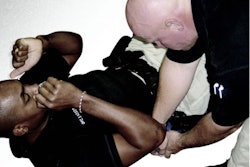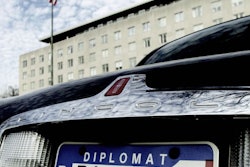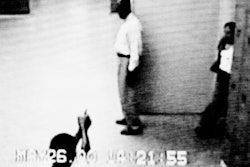You don't have to be a frequent traveler to benefit from the skills of the airport police. Most people don't even think about the job they do. Maybe that's because part of their job is maximizing efficiency and making sure travelers get to their destinations with as little disturbance as possible.
9/11 changed many things, one being the importance of the cops who man the nation's airports. Whether you're aware of it or not, officers are guarding the safety of the entire country by monitoring the gateways to the rest of the world.
"I think the airport is one of those places that people don't really think about until there's a major event," says Chicago-area airport security chief Jim Maurer. But law enforcement officers working at the country's airports work day in and day out, often behind the scenes, to make sure the public doesn't have to think about what could go wrong.
Unique Mission
Policing an airport differs from working at a municipal or county agency in a number of ways. One major difference is the unilateral focus of the agency's officers, regardless of their specific assignment.
Officer James Montano Jr. says he left the Orange County (Calif.) Sheriff's Department to join the Los Angeles Airport Police because he wanted to actively combat terrorism. He says he now appreciates the feeling that he's constantly working toward a larger goal that all of his colleagues share.
"What I think is unique about airports is this is a business. And our job is to make sure that that business is conducted efficiently. We've got to get people in and out of the airport and we've got to get them to their destinations. There's a whole different perspective," says Maurer.
Having worked his way up through the Chicago Police Department in his 41-year law enforcement career, Maurer has a good feel for the differences between traditional municipal policing and law enforcement at his new job heading up security with the Chicago Aviation Division, which puts him in charge of all officers at the O'Hare and Midway airports.
"From a municipal police standpoint, you have a community that's there all the time," Maurer says. "The airport is a very different environment; it's changing all the time.
"We may get business travelers that come here frequently, but they're only here for a couple hours each way. So our population changes constantly."
Some of these temporary "residents" are visiting diplomats who require the services of the airport's dignitary protection.
"Because of the region that we're in, we also handle the highest concentration of dignitaries," says Superintendent Samuel J. Plumeri Jr. of the Port Authority of New York and New Jersey. "The United Nations is in New York, and they travel either by JFK, LaGuardia, or Newark, which we own, and Peterboro, which is a smaller airport. We face those challenges every day with a higher concentration of heads of state and diplomats than any other police force in the nation."
The Port Authority's airport police were recently put to the test when the United Nations, headquartered in New York, invited a veritable who's who of diplomats to attend its sixtieth anniversary celebration.
"The Port Authority Police provided security and protection for more than 250 heads of state who attended that conference," says Plumeri. "That is a huge challenge, as you can imagine."
Plumeri says his officers handled the proceedings flawlessly, working with federal agencies to coordinate airport arrivals and departures and even transportation for United Nations guests throughout the city. They've had a lot of practice providing protection, and in handling diplomacy themselves.
"Sometimes Port Authority police officers have to fulfill the role of diplomats," says Plumeri, "with something as simple as where you park aircraft from different countries that are perhaps at war or engaged in some kind of diplomatic hostility," says Plumeri.
Maintaining Order
Despite the differences between airport policing and municipal agencies, many of the same safety rules hold true across the board, a reality many travelers don't recognize.
Montano's frequent partner, Officer Sonny Chow, often finds himself setting people straight on this subject, especially when they stop their cars and hold up traffic in front of LAX terminals.
"I ask people, 'Would you have done what you just did on a major city street like Century Boulevard?'" says Chow. "They say, 'Of course not.' And I say, 'What do you think you're on?' People are surprised to find out this is a city street. They think this is a big parking lot."
But such seemingly mundane tasks as making sure all vehicles on the air field are appropriately marked are actually vital security checks. Any unmarked car found on airport property could be a bomb waiting to explode. The same holds true of unattended baggage.
"I don't like standing next to unattended luggage," says LAX Officer Sonny Chow, musing on the dangers of this task. "But it's part of my job. I need to make sure that no one else disturbs the bag until someone else comes to check it out."
Getting an all-clear on unattended baggage has become much easier with the advent of airport-specific K-9 units.
"Our K-9 unit is our number one asset," says Chief Leo J. Rossiter of the Metropolitan Washington Airports Authority that polices Dulles and Reagan National airports. "When we have an unattended bag, we can clear those things in a limited amount of time in the airport. Sometimes it would take an hour or two hours. Now it takes a few minutes because of the K-9s."
And because running an airport is a business, time is money. Police assigned to the country's airports have to balance security and profitability at all times, which makes their job all the more difficult.
Cross Training
Despite the singular purpose of the airport police, the skills needed to execute the overall goal of maintaining the safety and security of the people and property there are many and varied. "You definitely have to multitask in this position," says Montano. "That's a given."
Most airport police officers undergo the same academy training as local city or state officers. But most also undergo additional training that sets them apart from their local counterparts.
For example, firefighting might not be something normally associated with law enforcement, but all airport officers of the Port Authority of New York and New Jersey undergo extensive aircraft rescue firefighting training twice a year. Approximately 600 officers receive the training, which allows them to react immediately to aircraft fires and evacuate passengers without waiting for fire departments to respond.
Los Angeles Airport Police go through 21 weeks of training at the local academy, then complete 40 hours of aviation training, then undergo training in responding to Weapons of Mass Destruction, as well as continuous training throughout their careers.
"LAX is the number one terrorist target in California, so we must have the best officers and the best training," says Montano.
Of course, police officers are also required to work with the public on a regular basis, much of which requires being able to effectively communicate with a wide range of people. And in an airport, that often means being able to speak travelers' native languages. It also means understanding the other ways in which people from other countries communicate, and how best to respond.
While cultural sensitivity is important in any agency, it is even more so at an airport where communicating with international travelers from all over the world is a regular occurrence.
"We've got people from all over the world. Obviously, they have different impressions of things and different needs, and we have to be sensitive to those things," says Maurer. Chicago's airport system uses videos produced by the Chicago Police Department to educate its officers about various cultures they might encounter on the job.
"Little customs can mean so much in the way you communicate with a person," says Maurer. "For instance, you may think you're being friendly by shaking hands with someone, but in some cultures it's absolutely a no-no, and our people have to be sensitive to that."
Airport police also train with local municipal, county, state, and federal agencies on a regular basis.
"We go through a lot of training here at the airport, including tabletop exercises," says Joe Connor, Deputy Commissioner of Security and Public Safety for the Chicago Airport System. "We train with all the different agencies, including the federal agencies. You can go through the whole alphabet soup. In fact, we just finished tabletop exercises on just things that may happen in the future, including the Avian Flu."
All manner of things can happen at an airport. The only thing law enforcement can do is be prepared as best as possible for every situation imaginable.
Expecting the Unexpected
Sometimes the situation is escaped cargo with feet and big teeth. Such was the case at LaGuardia Airport in New York in October 2003 when two alligators were loose in the cargo area of a plane flying from Miami.
"When it landed, the Port Authority Police dispatched their emergency services unit, a separate specialized unit, to the scene," remembers Tony Ciavolello, a public information officer for the Port Authority. "They were able to catch two alligators with the one closing loop device that they actually had on them. They had the equipment."
It pays to be prepared. Luckily, this was an isolated incident and no passengers were ever in any danger. But some airports have more regular run-ins with wildlife.
"We have animals running all over this airport," says Maurer of Chicago O'Hare. "We've got the Department of Agriculture coming in here, trying to trap the animals and move them to keep them from running out on the runways, which is a very serious thing," he says.
Airport police at O'Hare also recently dealt with animals that wandered into terminals, causing quite a commotion among travelers. It's not every day that you see a deer or a red-tailed hawk making its way down an airport concourse. But most officers have learned to take such incidents in stride.
"That's what I like about my job," says Montano. "It changes every day. I never get bored."
Unfortunately, some of the unexpected events officers must handle at their jobs are heartbreaking.
"There are times when people stow away from other countries, trying to get to this country by hiding in the wells of an aircraft," says Plumeri. "They don't realize that there's no pressurization there and it gets cold. We've had some really unfortunate situations that when people did get here they'd expired."
The Real Deal
"People think airport police aren't real cops. But we're out here to protect the public and do our job," says Montano of the Los Angeles Airport Police Department.
Montano knows how dangerous policing an airport can be. He was deeply affected by the death of his first FTO and mentor in May.
Officer Tommy Scott stopped a man along the perimeter of LAX airport property. Somehow, the man, later identified as William Sadowski, got control of Scott's patrol car and began driving it away. Scott held onto the driver's side door, attempting to regain control of the vehicle. Sadowski ran the car into a fire hydrant, which killed Scott on impact. He was the first officer in the agency's 59-year history to be killed in the line of duty. Scott was 36 years old.
"That's something I carry with me every day," says Montano. "You just can't get complacent."
The Port Authority police are more than aware of the importance of protecting the public and themselves from threats. They haven't forgotten the 37 members of their agency who were killed on 9/11 at the hands of terrorists.
"It's very personal," says Plumeri. "When I speak about this as personal, I refer back to a very personal loss that this agency experienced. And it's something that we never want to see happen again. We're attuned to that every day, very cognizant of people that would do us harm, and work at doing our best every day."











